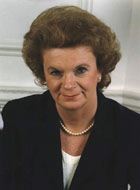Helen Liddell in the Press
 Abandon hope all ye who enter here.
Sign the Helen Liddell Guestbook
 This page has been visited
 Home |

A matter of priorities for LiddellCATHERINE MacLEOD and VALERIE HANNAHHELEN Liddell was at Paddington station en route to her home in Scotland on Wednesday evening when the call came from the prime minister, offering her a seat in the cabinet as secretary of state for Scotland.Any misgivings Mrs Liddell had ever entertained about returning to Scottish politics were quickly dispelled. She accepted with alacrity. Mrs Liddell, Airdrie and Shotts MP, becomes the first woman to hold the keys of Dover House, the headquarters the Scotland Office in London. But she is neither the first Scottish woman in the cabinet, nor the first woman from Airdrie and Shotts. That was none other than the formidable pensions minister in Harold Wilson's government, Peggy Herbison, who played a major role in the development of the welfare state. She was born in Shotts. When she retired after 25 years as Labour MP for North Lanark in 1970, she was replaced by one of her proteges - the late John Smith. She died in December 1996, aged 89, with the main tribute at her funeral given by Mrs Liddell. Yesterday, Mrs Liddell should have attended her first cabinet meeting in Downing Street. But, during the call with Mr Blair, Mrs Liddell did what few newly-promoted cabinet ministers have ever done before. She told the prime minister she would be unable to attend her first cabinet because she was attending the funeral of motor cycle crash victim Keith Young, the son of TV presenter Chick and his ex-wife Sally Carr. Mrs Liddell and Ms Carr are long-standing friends. Last night, she said: "I told Sally on Sunday that I would be at her son's funeral regardless of whatever else I was doing. "I didn't know I would be telling the prime minister I couldn't go to the cabinet. But I knew that my place yesterday, whatever else was happening, was at the funeral with my kids and Sally." Mrs Liddell reached Meridian House, the Scotland Office home in Glasgow, around 2pm, met her staff - some of whom she knew from her earlier stint at the Scottish office - looked at the diary inherited from her predecessor, Dr John Reid, met the Scottish media, spoke twice to the prime minister, and prepared for a party last night at Labour's Glasgow HQ. There was no mistaking Mrs Liddell's elation at her elevation. She said: "I am delighted to be here as secretary of state for Scotland. It is a privilege for any politician to become secretary of state for their country. It is a particular privilege for me, not just to be secretary of state, but to become a member of the Labour cabinet." Mrs Liddell's elevation attracted immediate opprobrium from her political opponents, and critics in Scotland. There was little celebration of a woman in the top job. Instead, the Scottish Nationalists hailed the appointment as an electoral gift for them, "worth 10,000 votes to us every time she opened her mouth". But Mrs Liddell's appointment was no surprise at all to the Westminster cognoscenti. Having escaped from the Scottish office in 1999 for a truncated tenure in the department of transport, she prospered in her brief at the DTI. For the last 15 months, Mrs Liddell has toured European capitals constructing the government's policy on energy and competitiveness in Europe. Out of the media glare, and away from the tensions of Scottish politics, her application to the minutiae of a complicated brief impressed the prime minister. That her promotion, in the wake of Peter Mandelson's demise, plunges her back into the hothouse of Scottish politics may not have been her favoured route to the top table, but she understood it was a chance not to be missed. It will be tough. Mrs Liddell's political skills will be tested to the utmost. Not only will she have to build bridges with Henry McLeish, Scotland's first minister, with whom she enjoyed a less than close relationship in the pre-devolution Scottish Office, she will have to work closely with Douglas Alexander, the general election co-ordinator. During the Scottish parliamentary election campaign, it was an open secret in Glasgow's Labour headquarters that relations between Mrs Liddell and Mr Alexander hit rock bottom. Now, whatever their private difficulties, they will mend their fences. Number 10 will expect no less. Looking forward to working closely with her Scottish colleagues as she heads Labour's general election campaign in Scotland, she said: "We're all in the one boat with a general election coming up between now and 2002. We all need to pull together. I've always tried to be loyal and never seen any indication that they've been less than loyal to me. I'm a team player." - Jan 26
|
